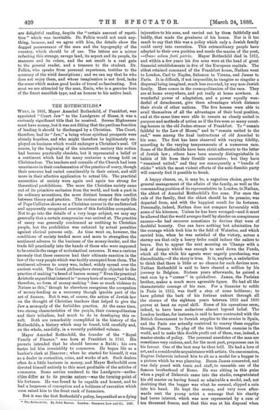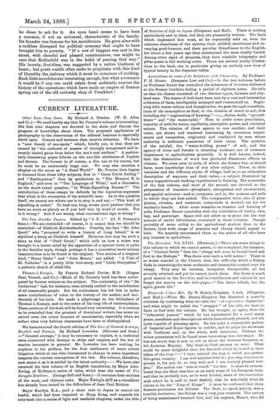THE ROTHSCHILDS.*
WHEN, in 1801, Mayer Amschel Rothschild, of Frankfort, was appointed "Court Jew" to the Landgrave of Hesse, it was a curiously significant title that he received. Serene Highnesses must have money, but it was not fitting that the perilous function of lending it should be discharged by a Christian. The Court, therefore, had its "Jew," a being whose spiritual prospects were already hopeless, and who might therefore be legitimately em- ployed on business which would endanger a Christian's soul. Of course, by the beginning of the nineteenth century this notion had become practically obsolete, but it represented a belief or a sentiment which had for many centuries a strong hold on Christendom. The teachers and councils of the Church had been unanimous in their condemnation of the practice of usury, though their censures had varied considerably in their extent, and still more in their effective application to actual life. The practical necessities of society were again and again too strong for theoretical prohibitions. The more the Christian society came out of its primitive seclusion from the world, and took a part in its ordinary avocations, the more distinct became this conflict between theory and practice. The carious story of the early life of Pope Callixtus shows us a Christian usurer in the undisturbed and apparently recognised exercise of this forbidden occupation. Not to go into the details of a very large subject, we may say generally that a certain compromise was arrived at. The practice of usury was generally condemned as unfitting to Christian people, but the prohibition was enforced by actual penalties against clerical persons only. As time went on, however, the conditions of society tended more and more to strengthen the sentiment adverse to the business of the money-lender, and the trade fell practically into the hands of those who were supposed to be outside the range of ecclesiastical censures. It was a curious anomaly that these censures had their ultimate sanction in the law of the very people which was tacitly exempted from them. The sentiment adverse to usury was, indeed, widely spread over the ancient world. The Greek philosophers strongly objected to the practice of making "a breed of barren money." Even the practical Aristotle argued that interest is "money born of money," and that, therefore, no form of money-making "does so much violence to Nature as this," though he elsewhere recognises the occupation of money-lending as a necessary though ignoble part of the art of finance. Bat it was, of course, the action of Jewish law on the thought of Christian teachers that helped to give the Jew a monopoly of the forbidden practice. At the same time, two strong characteristics of the people, their cosmopolitanism and their tribalism, had much to do in developing this re- sult. Both are remarkably exemplified in the history of the Rothschilds, a history which may be found, told carefully and, on the whole, candidly, in a recently published volume.
Mayer Amschel Rothschild, the founder of the "Royal Family of Finance," was born at Frankfort in 1743. His parents intended that he should become a Rabbi ; his own tastes led him irresistibly to commerce. He began life as a banker's clerk at Hanover ; when he started for himself, it was as a dealer in curiosities, coins, and works of art. Such dealers often do a little business in money, and Mayer Rothschild soon devoted himself entirely to this most profitable of the articles of commerce. Some service rendered to the Landgrave—autho- rities differ as to its precise nature—was the turning-point of his fortunes. He was found to be capable and honest, and he had a largeness of conception and a boldness of execution which soon raised him to the front rank of financiers.
But it was the first Rothschild's policy, bequeathed as a dying
• The Rothschild/1. By John Reeves. London : Sampson Low and Co. 1887.
injunction to his sons, and carried out by them faithfully and boldly, that made the greatness of his house. Nor is it too much to say that this was a policy which only a Jewish family could carry into execution. This extraordinary people have adapted to their own position and needs the maxim of the poet, —Omne solum forts patria. Mayer Rothschild died in 1812, and within a few years his five sons were at the head of great financial establishments in five of the European capitals. The eldest retained command of the Frankfort house, Nathan went to London, Carl to Naples, Salomon to Vienna, and James to Paris. It is difficult, if not impossible, to imagine so singular a dispersal being imagined, much less executed, by any non-Jewish family. Here comes in the cosmopolitanism of the race. They are at home everywhere, and yet really at home nowhere. A wonderful power of adaptation, and a power equally won- derful of detachment, give them advantages which distance their rivals of other nations. The five houses were able to avail themselves of all the advantages of their local position, and at the same time were able to remain as closely united in purpose and methods of action as if the five were so many count- ing-houses in the old Juden.strasse of Frankfort. To "remain faithful to the Law of Moses," and to "remain united to the end," were among the final instructions of old Amschel to his sons. The first has been observed with varying fidelity, according to the varying temperaments of a numerous race. Some of the Rothschilds have been strict adherents to the letter of Jewish law ; others have been scarcely distinguishable in habits of life from their Gentile associates ; but they have "remained united," and they are consequently a "bundle of sticks" which the most violent efforts of the anti-Semitic party will scarcely find it possible to break.
A happy chance, or, it may be, a sagacious choice, gave the general management of the affairs of the family, as well as the commanding position of its representative in London, to Nathan, the ablest of Amschel Rothschild's five sons. For once the rule of the family, that the eldest should be its premier, was departed from, and with the happiest result for its fortunes. Personally, indeed, Nathan does not compare favourably with some of his kinsmen. Unless he has been wronged—and it must be allowed that the world avenges itself by slander on conspicuous success—he had recourse sometimes to devices that were of doubtful honesty. One can have nothing but admiration for the courage which took him to the field of Waterloo, and which carried him, when he was satisfied of the victory, across a stormy sea that only a heavy bribe could induce the sailors to brave. But to appear the next morning on 'Change with a look of despair which was enough to send down the Funds, which all the while his agents were eagerly purchasing, was discreditable,—if the story is true. It is, anyhow, a satisfaction to think that there is little or no chance for such devices now. Nathan Rothschild is said to have cleared a million by his journey to Belgium. Sixteen years afterwards, he gained a vast sum by a " corner " in quicksilver. James, the Parisian brother, makes a much more agreeable figure. He had all the characteristic courage of his race. For a financier to settle in Paris in 1812, was itself a step of some boldness ; to have piloted the bark of his fortune unhurt through all the storms of the eighteen years between 1812 and 1830 proves at least an equal skill. Some of his operations seem, indeed, to have been audacious almost beyond belief. The London brother, for instance, is said to have contracted with the British Government to furnish supplies to the armies in Spain, and the Paris one actually contrived to convey these supplies through France. To play off the two bitterest enemies in the world, and to make this double profit out of them, was, indeed, a master-stroke of policy. The personal anecdotes of the man are sometimes very curious, and, for the most part, prepossess one in his favour. One of the best may be thus told. He had a love of art, and a considerable acquaintance with artists. On one occasion, Eugene Delacroix induced him to sit as a model for a beggar in a picture which he was planning. Baron James consented, and was duly posed with tunic and staff, to resemble one of the famous brotherhood of Rome. He was sitting in this guise when a pupil of Delacroix came into the studio, congratulated his old master on having found so admirable a model, and, not doubting that the beggar was what he seemed, slipped a coin into his hand. He kept the money, and very soon after- wards sent the young artist a message that his charity had borne interest, which was now represented by a sum of ten thousand francs, and that this was at his disposal when he chose to ask for it. An open hand seems to have been a common, if not an universal, characteristic of the family. Its founder was famous for his munificence. He gave alms with a reckless disregard for political economy that ought to have brought him to poverty. "If a row of beggars was met in the street, with cheerful and pleased countenances, one might be sure that Rothschild was in the habit of passing that way." His bounty, doubtless, was suggested by a native kindness of heart ; but great wealth often seeks to propitiate with this kind of liberality the jealousy which it must be conscious of exciting. Such little anecdotes are interesting enough, but what a romance it would be if any one could relate from authentic sources the history of the operations which have made an empire of finance spring out of the old curiosity shop of Frankfort !



































 Previous page
Previous page